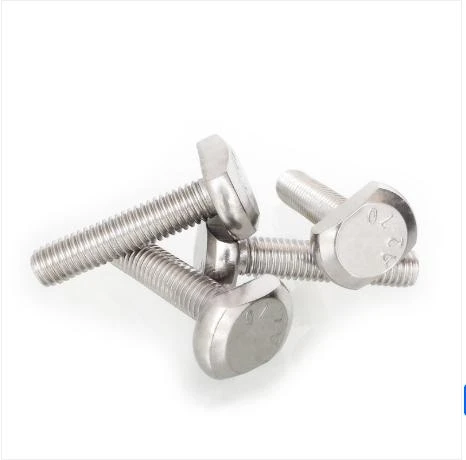

titanium fasteners
Dec . 19, 2024 00:06 Back to list
titanium fasteners
Understanding Titanium Fasteners The Future of Fastening Solutions
Titanium fasteners have emerged as a cornerstone in various industries, from aerospace to marine engineering, due to their unique properties and advantages. As industries continue to seek lightweight, durable, and resistant fastening solutions, titanium proves to be an increasingly advantageous material.
The Composition and Properties of Titanium
Titanium is a transition metal characterized by its remarkable strength-to-weight ratio. While being approximately 45% lighter than steel, it maintains a higher strength level, making it an attractive alternative. Its density is significantly lower and, thus, is ideal for applications where weight savings are critical without sacrificing performance. Titanium fasteners are known for their excellent corrosion resistance, particularly in aggressive environments like saltwater or acidic conditions. This property stems from titanium's ability to form a protective oxide layer, which prevents further oxidation and degradation.
The material is also noted for its bio-compatibility, which is why titanium fasteners are increasingly found in the medical industry for surgical implants and devices. Overall, titanium is favored for applications that require not only strength and lightness but also reliability and longevity.
Applications of Titanium Fasteners
1. Aerospace Industry The aerospace sector is one of the largest consumers of titanium fasteners. Aircraft manufacturers utilize titanium in their designs to reduce weight while maximizing strength. Fasteners made from titanium are used in various critical components, including airframes, engines, and landing gears. The weight reduction achieved by using titanium fasteners can improve fuel efficiency and overall performance, making it a preferred choice.
2. Automotive Engineering In the automotive industry, particularly in high-performance and racing vehicles, titanium fasteners are employed to enhance performance while reducing overall vehicle weight. They are commonly found in engine components, suspension systems, and exhaust systems.
3. Marine Applications Titanium fasteners are indispensable in marine environments due to their exceptional resistance to saltwater corrosion. They are frequently used in shipbuilding, offshore oil rigs, and any application where fasteners are subject to harsh environmental conditions.
4. Medical Devices In the medical field, titanium fasteners are used in implants and surgical instruments due to their bio-compatibility. Titanium does not elicit an adverse reaction in the human body, making it an ideal choice for devices that require long-term integration within biological systems.
The Advantages of Using Titanium Fasteners
titanium fasteners

The transition towards titanium fasteners is driven by several key advantages
- Lightweight The reduced weight of titanium fasteners contributes significantly to weight savings in assemblies, which is crucial in applications where every gram counts.
- Corrosion Resistance Titanium’s resistance to corrosion extends the lifespan of components and reduces maintenance costs associated with fastener replacements.
- Heat Resistance Titanium fasteners can withstand high temperatures, making them suitable for applications that experience fluctuating thermal conditions.
- Increased Strength The inherent strength of titanium means that, often, fewer fasteners are needed for a given application. This can simplify installations and save costs on materials.
- Low Thermal Expansion Titanium has a low coefficient of thermal expansion, which means it maintains dimensional stability in varying temperature ranges, a critical factor in precision applications.
Challenges and Considerations
Despite the numerous advantages, there are challenges associated with titanium fasteners. They can be more expensive than traditional materials, such as steel or aluminum, which can be a barrier in cost-sensitive applications. Additionally, titanium fasteners may require specialized tools for installation due to their unique properties.
Conclusion
Titanium fasteners are an innovative solution that combines strength, lightweight, and durability across multiple industries. As technology advances and industries continue to prioritize performance and efficiency, the use of titanium fasteners is expected to rise significantly. For engineers and designers looking for reliable and high-performing fastening solutions, the benefits of titanium are clear, representing the future of fastening technology. Whether in aerospace, automotive, marine, or medical fields, titanium fasteners are set to play a vital role in shaping the next generation of durable and efficient products.
Latest news
-
High-Strength Hot-Dip Galvanized Bolts-Hebei Longze|Corrosion Resistance&High Strength
NewsJul.30,2025
-
Hot Dip Galvanized Bolts-Hebei Longze|Corrosion Resistance&High Strength
NewsJul.30,2025
-
Hot Dip Galvanized Bolts - Hebei Longze | Corrosion Resistance, High Strength
NewsJul.30,2025
-
High-Strength Hot Dip Galvanized Bolts-Hebei Longze|Corrosion Resistance, Grade 8.8
NewsJul.30,2025
-
Hot Dip Galvanized Bolts-Hebei Longze|Corrosion Resistance,High Strength
NewsJul.29,2025
-
High-Strength Hot Dip Galvanized Bolts - Hebei Longze Metal Products Manufacturing Co., Ltd.|corrosion resistance&high strength
NewsJul.29,2025

